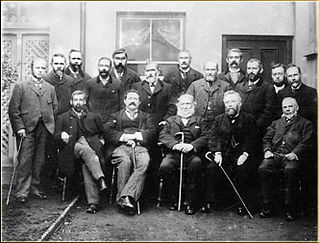The Aberdare Urban District Council was established in 1894 and covered the parish of Aberdare. Its responsibilities included public health, sanitation, roads and public works generally.

Aberdare Urban District Council was a local authority in Aberdare, Wales. It was created in 1894 as a result of the 1894 Local Government of England and Wales Act and the Aberdare Urban District Council election, 1894 saw the election of the first members of the authority. The Council existed until 1973 and replaced the Aberdare Local Board of Health which had functioned since the 1840s. Its boundaries were identical to those of the original parish of Aberdare. Initially, the Council had fifteen members but this was increased to twenty in 1906, as a result of the increase in population. There were five wards, namely Aberaman, Blaengwawr, Gadlys, Llwydcoed, and the Town Ward.
Contents
There were five wards, namely Aberaman (also known as No. 5 Ward), Blaengwawr (also known as No. 4 Ward), Gadlys (also known as No. 2 Ward), Llwydcoed (also known as No. 1 Ward), and the Town Ward (also known as No. 3 Ward). At this time, one member was elected from each ward on an annual basis.
The community of Aberaman, Rhondda Cynon Taf was an electoral ward for much of the twentieth century, for the purposes of electing members to Glamorgan County Council and the Aberdare Urban District Council. It currently comprises two electoral wards, Aberaman North and Aberaman South, for the purposes of electing members to the Rhondda Cynon Taf County Borough Council. Aberaman North is composed mainly of Aberaman itself while Aberaman South includes Abercwmboi, Cwmaman, Godreaman and Glynhafod.
Blaengwawr was, for much of the twentieth century, an electoral ward for the purposes of electing members to Glamorgan County Council and the Aberdare Urban District Council. Blaengwawr no longer forms an electoral ward and is part of Aberaman.
Gadlys was, for much of the twentieth century, an electoral ward for the purposes of electing members to Glamorgan County Council and the Aberdare Urban District Council. Gadlys no longer forms an electoral ward and is part of Aberdare.
In contrast to the inaugural contest, the election of 1896 created little excitement, with three of the five seats being uncontested. [1] Of the two contested sets, it was the Gadlys Ward that attracted most coverage in the local press [2] The election provides evidence of the way in which the nonconformist middle-classes of Aberdare, closely allied to the Liberal party were increasingly dominating the public life of what was an important politicale centre in Wales.[ citation needed ] [3] At this time, also the working classes were beginning to become organised through the miners' union and, to a lesser extent, the Independent Labour Party. [4]

The Independent Labour Party (ILP) was a British political party of the left, established in 1893, when the Liberals appeared reluctant to endorse working-class candidates, representing the interests of the majority. A sitting independent MP and prominent union organiser, Keir Hardie, became its first chairman.
The election is interesting and relevant because it demonstrates the nature of social interaction between the middle- and working-classes in the industrial south Wales of the 1890s. It was a time of industrial disputes and conflicts but also of concern about lack of educational opportunities for working-class children and the state of housing. It would appear that the miners and other workmen, once a set of middle-class councillors had been elected, were willing to allow those members to represent the community. [5]
(*) denotes sitting member
